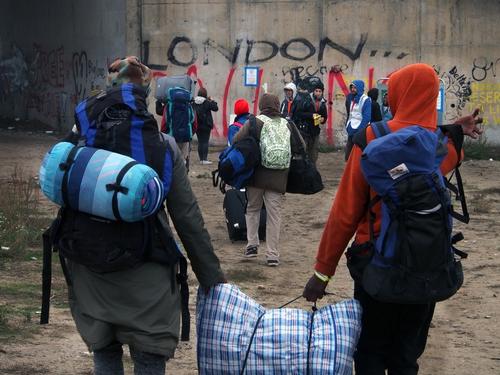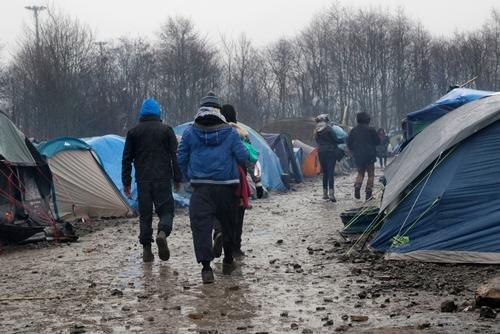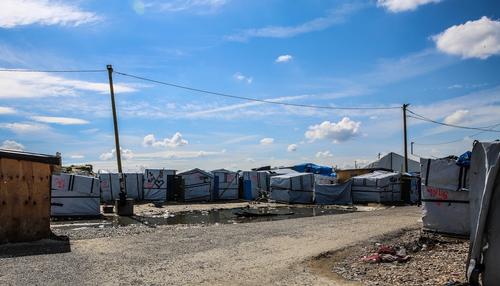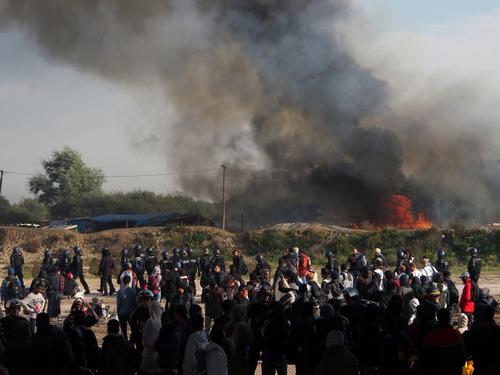At the entry to the Jungle, the main strip gives the impression of a ghost town. The various stalls, Afghan restaurants and barbershops, are now nothing more than empty barracks with shopfronts obscured by plastic tarpaulins. A few remain but with broken windows. They have been dismantled and the wood removed, a precious commodity with the returning cold. The shop doors bear placards ordering the "immediate expulsion of 72 illegal commercial spaces" of the Calais shantytown.
"Where will I sleep next week?"
A few surviving shops and restaurants continue to offer cheese naan bread, chicken and crates of tomatoes to the 6,000 migrants who still live here. Men bustle about the place, sucking on their cigarettes, speaking with incredulity, nervousness or resignation about the final throes of the dismantlement.
"Where will I sleep next week ? Nantes? Marseille? Lyon?" asks a 50 year old Afghan with a silver beard. Speaking neither French nor English, he arrived in Calais a few months ago with the sole aim of joining his family in Britain. The announcement of the dismantlement has plunged him into anguish.
Behind him, Sudanese men pass by avoiding puddles, carrying bin bags full of clothes. Between the tents and the makeshift shelters, people are preparing for the move.
On the road again
At the welcome centre for unaccompanied foreign minors, managed by the Refugee Youth Service and MSF, backpacks are distributed by the hundred. They contain a map of France, a poncho, instructions for free phone charging, and a little plastic information card in many languages explaining how to book a doctor, find legal counsel, or a shelter. A little kit that could become extremely useful.
As of Monday 24 October, many of the jungle's inhabitants will be bussed to the welcome and orientation centres dotted throughout France. The jungle will be razed.
A few seem impatient to go, having waited for weeks to be able to find warmth, or to lodge an asylum claim, imagining a future in France.
A group of Sudanese men warm themselves over a cup of tea, "The jungle is finished!" they happily proclaim, between two newly learned French words.
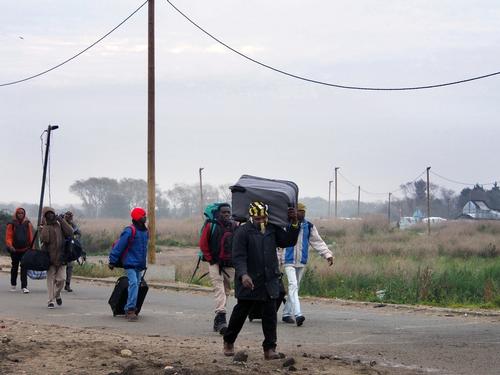
Most will take to the road again, clandestine and errant along the roads of northern France. They will continue to attempt the crossing towards Britain, where family or close friends are often waiting for them.
Unaccompanied youths
The minors will wait a few more days in the 'jungle', hosted in containers at the provisional welcome centre. During this time, all the family reunification demands will be examined by British officials. This work has already started, raising hopes and fears among those who already feel isolated. In the last few days, nearly 200 minors have already left here to rejoin their families in Britain.
People congregate in front of the entrance to the containers where people lodge their requests. If someone receives a positive answer, the lucky person leaves full of joy, congratulated by their groups of friends who shout, "England! England!". The end of months of struggle.
Not all will have this chance though. Many will be sent to CAOMIE, the system that manages minors.
Bitterly, Ali remarks: "I want to go to the UK to join my uncle. I've tried the crossing many times, but it never worked. I too will ask to go to the UK, but I'm not hopeful. And if this doesn't work, what then? Maybe I will try to stay in France alone. I still don't know where I will sleep next week".



